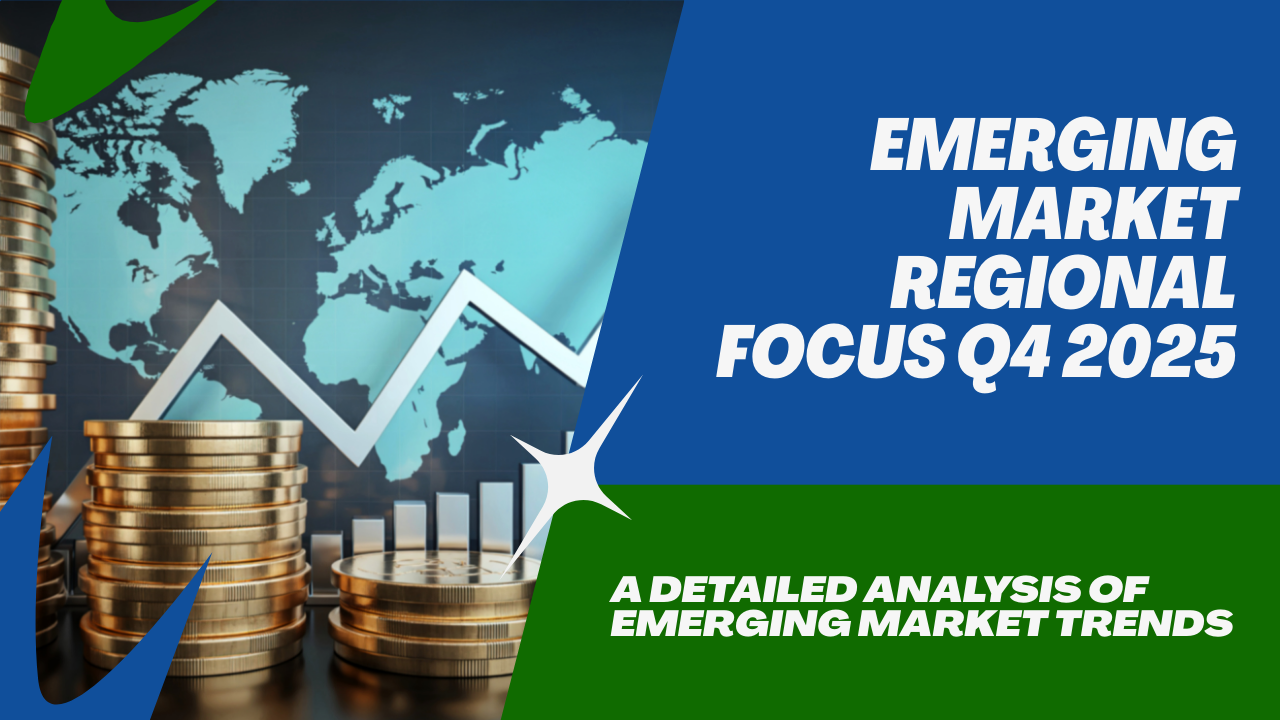Introduction: Why Regional Focus Matters in Q4 2025
Emerging markets (EM) are often grouped together as a single asset class. But by Q4 2025, the divergences between regions are too large to ignore.
- Asia continues to drive global growth, led by India’s expansion and Southeast Asia’s industrial transformation.
- Latin America is benefiting from nearshoring and commodity demand, though political volatility lingers.
- Africa & the Middle East show a mix of resilience and fragility, with structural reforms in some countries offset by fiscal and governance risks.
For global investors, regional focus is no longer optional — it is the key determinant of portfolio performance.
Asia Spotlight
India: The Anchor of EM Growth
- GDP Growth: >6%, strongest among large EMs.
- Reforms: Infrastructure push, digital financial inclusion, manufacturing incentives.
- Markets: Equity valuations high but supported by earnings growth; INR stable due to FX reserves.
- Investor Implication: India is a core overweight across equities, bonds, and ESG-linked instruments.
China: Transition Amid Challenges
- Growth: 4–4.5%, weaker than historical trends.
- Policy: Stimulus supports infrastructure and green projects, but property market drags persist.
- Markets: Equities remain volatile; yuan under depreciation pressure.
- Investor Implication: China shifting from growth driver to selective, policy-linked plays.
Indonesia: Commodity + EV Supply Chain Winner
- Growth: 5%+, supported by nickel exports and domestic demand.
- Markets: IDR attractive for carry; equities tied to mining and EV ecosystem.
- Investor Implication: High-beta tactical exposure for investors seeking commodity-linked growth.
Vietnam: Supply Chain Realignment
- Growth: Manufacturing hub benefits from diversification away from China.
- Markets: Equity market reforms attract institutional flows; dong stable.
- Investor Implication: Strong structural growth story, appealing to long-term investors.
Latin America Spotlight
Mexico: The Nearshoring Star
- Growth: Benefiting from U.S. integration and industrial relocation.
- Markets: MXN remains top carry currency; equities favored in logistics and industrials.
- Investor Implication: Mexico is structurally overweight in Q4 2025 portfolios.
Brazil: Commodities and Fiscal Balancing
- Growth: Commodity exports (soy, iron ore, oil) underpin economy.
- Risks: Fiscal slippage and political noise.
- Markets: BRL offers carry but volatility high; equities selective.
- Investor Implication: Tactical opportunities in commodities and carry trades.
Chile & Peru: Lithium and Copper Giants
- Growth: Energy transition boosts demand for copper/lithium exports.
- Risks: Governance and social unrest.
- Investor Implication: Attractive for thematic exposure to clean energy, but with higher risk premiums.
Colombia: Mixed Signals
- Growth: Oil and coal exports steady, but fiscal and political challenges linger.
- Markets: COP volatile, not core allocation.
- Investor Implication: Suitable only for tactical positioning.
Key Takeaways (Mid-Quarter Insights)
- Asia remains the global growth engine, with India and Vietnam leading.
- Latin America is a commodity and nearshoring story, with Mexico strongest.
- Investors should prioritize India, Mexico, and Indonesia as structural overweights, while keeping Brazil and Chile as tactical/thematic exposures.
EMEA Spotlight
South Africa: High Yields, High Risks
- Growth: Stagnant at ~1%.
- Strengths: Strong commodities (platinum, gold), attractive real yields.
- Risks: Power shortages, fiscal pressures, weak governance.
- Investor Implication: ZAR is a high-beta proxy for global risk; use tactically.
Turkey: Volatile but Normalizing
- Growth: Recovery after policy normalization, but inflation >40%.
- Strengths: Tourism revenues, improved CB credibility.
- Risks: External debt, political instability.
- Investor Implication: Speculative trades only, not for core portfolios.
Nigeria: Untapped Potential, Structural Weakness
- Growth: Driven by oil exports and demographics.
- Risks: FX instability, security challenges.
- Investor Implication: Long-term potential but near-term fragile.
Gulf States: Stability Anchors
- Strengths: Oil exports, fiscal surpluses, pegged FX.
- Markets: Sovereign wealth funds increasingly invest in global ESG and tech.
- Investor Implication: Stable anchors; no carry trade but useful for diversification.
Cross-Regional Themes
1. Nearshoring and Supply Chain Realignment
- Mexico and Vietnam biggest winners.
- India also benefits through manufacturing expansion.
2. Energy Transition and Green Commodities
- Chile, Peru, Indonesia dominate copper, lithium, nickel.
- ESG compliance required for global supply chain access.
3. Demographics and Inclusion
- Africa and South Asia host fastest-growing populations.
- Long-term drivers for consumption, education, and healthcare.
4. Policy Credibility as Differentiator
- Countries with credible central banks and transparent ESG frameworks (India, Mexico, South Africa) attract stable capital.
- Policy inconsistency leads to capital flight (Turkey, Argentina).
Portfolio Implications
- Core Allocations: India, Mexico, Indonesia, Vietnam.
- Tactical Plays: Brazil (commodities), South Africa (high beta), Chile (lithium/copper).
- Speculative Trades: Turkey, Nigeria.
- Hedging Anchors: GCC currencies, U.S. Treasuries, gold.
Outlook Beyond Q4 2025
- By 2026, EM growth divergence will widen further.
- India and Mexico likely to be the structural leaders, supported by demographics and nearshoring.
- Africa offers long-term promise, but governance reforms are key.
- Investors should embrace a regional rotation strategy, dynamically shifting between Asia, LatAm, and EMEA based on macro cycles.
👉 For a forward-looking perspective, see our Emerging Market Regional Outlook 2026.

Leave a Reply